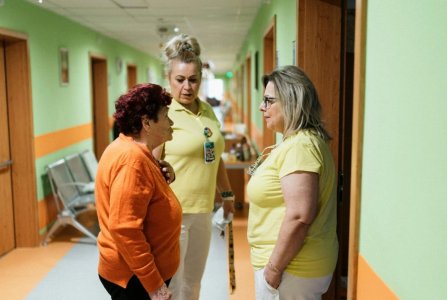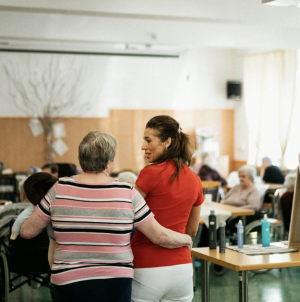How to choose the right assisted living facility: your step-by-step checklist
By
Veronica E.
- Replies 0
Choosing an assisted living facility is one of the biggest—and most emotional—decisions you or your loved one may ever face.
It’s not just about a place to live; it’s about finding a safe, supportive environment that feels like home.
The right community can provide peace of mind, new friendships, engaging activities, and just the right level of care.
But with so many choices, the process can quickly feel overwhelming.
This checklist is designed to guide you toward a confident, informed decision for the future.

Before you begin your search, it helps to understand the differences:
Staying close to familiar places, family, and friends can make a big difference. Think about:
Communities range from small and cozy to large campuses with extensive amenities.
Smaller facilities may feel more personal, while larger ones often offer pools, theaters, or gyms.
Touring in person will help you see which environment feels most welcoming.
Ask what daily life looks like:
Staff are the heart of any facility. Look at staff-to-resident ratios, employee turnover, and how staff interact with residents.
Unannounced visits at different times of day can give you a more honest picture.

Check for handrails, call buttons, clean hallways, and secure entrances.
Ask about emergency protocols and review recent inspection records for any violations.
Needs can change quickly, so find out how medications are managed, whether on-site nursing is available, and what happens if a resident’s health declines.
Ask about end-of-life options, palliative care, and communication with families.
With national averages around $5,900 a month, it’s vital to understand the financial side.
Review contracts for what’s included, how costs increase as care needs change, and whether deposits are refundable.

Ask about shuttles, parking, and fees for outings.
Accessibility to public transit or nearby services can also matter.
Inquire about plans for fires, natural disasters, or medical emergencies, and how families are notified.
Facts and figures matter, but so does your gut feeling.
If the community feels warm, respectful, and welcoming, you’re probably on the right track!

Some facilities offer respite visits.
A trial stay can give you a real sense of daily life before making a long-term commitment.
Choosing an assisted living community is never a decision to rush, but with the right checklist in hand, it can become a clearer and more positive process.
The best choice is one that balances safety, comfort, care, and the chance to enjoy daily life with dignity and joy.
Whether you are planning for yourself or helping a loved one, remember that this step is about creating a new chapter filled with support and opportunity.
Read next: Elder care in danger: Nursing homes shutter as demand soars

Have you been through the process of selecting an assisted living facility? What questions or concerns came up for you? Share your experiences and advice in the comments below—your insights could make this journey easier for someone else.
It’s not just about a place to live; it’s about finding a safe, supportive environment that feels like home.
The right community can provide peace of mind, new friendships, engaging activities, and just the right level of care.
But with so many choices, the process can quickly feel overwhelming.
This checklist is designed to guide you toward a confident, informed decision for the future.

Choosing the right assisted living community can make all the difference in comfort, care, and quality of life. Image Source: Pexels / Jsme MILA.
Step 1: Know the types of senior living options
Before you begin your search, it helps to understand the differences:
- Assisted living: For those who are mostly independent but need help with daily tasks like medication management or transportation.
- Nursing homes: For advanced needs, including rehabilitation or skilled nursing care.
- Board and care homes: Small, residential settings with more personal attention.
- Continuing care retirement communities (CCRCs): Offer multiple levels of care so residents can “age in place.”
Also read: Assisted living qualifications: What to expect and who it’s designed for
Step 2: Consider the location
Staying close to familiar places, family, and friends can make a big difference. Think about:
- Proximity to hospitals and doctors
- Access to shopping, parks, and activities
- Climate and environment—do you want to stay where you are or relocate?
Step 3: Size and atmosphere
Communities range from small and cozy to large campuses with extensive amenities.
Smaller facilities may feel more personal, while larger ones often offer pools, theaters, or gyms.
Touring in person will help you see which environment feels most welcoming.
Also read: Some places might surprise you as the best for seniors living alone
Step 4: Services, activities, and amenities
Ask what daily life looks like:
- Are meals nutritious and tasty?
- What kinds of activities or outings are offered?
- Are there libraries, gardens, or worship services available?
- Can they provide memory care or therapy if needed?
Step 5: Staffing and quality of care
Staff are the heart of any facility. Look at staff-to-resident ratios, employee turnover, and how staff interact with residents.
Unannounced visits at different times of day can give you a more honest picture.

Nutritious, appealing meals are an important part of daily life in any assisted living community. Image Source: Pexels / Kampus Production.
Also read: Seniors forced out to make room for luxury homes—find out what’s happening
Step 6: Safety and security
Check for handrails, call buttons, clean hallways, and secure entrances.
Ask about emergency protocols and review recent inspection records for any violations.
Step 7: Health and medical support
Needs can change quickly, so find out how medications are managed, whether on-site nursing is available, and what happens if a resident’s health declines.
Ask about end-of-life options, palliative care, and communication with families.
Step 8: Costs and contracts
With national averages around $5,900 a month, it’s vital to understand the financial side.
Review contracts for what’s included, how costs increase as care needs change, and whether deposits are refundable.

Carefully reviewing contracts and fee details helps avoid unexpected costs when choosing an assisted living facility. Image Source: Pexels / RDNE Stock project.
Also read: 7 costly caregiving myths that could be draining your wallet
Step 9: Transportation and accessibility
Ask about shuttles, parking, and fees for outings.
Accessibility to public transit or nearby services can also matter.
Step 10: Emergency preparedness
Inquire about plans for fires, natural disasters, or medical emergencies, and how families are notified.
Step 11: Trust your instincts
Facts and figures matter, but so does your gut feeling.
If the community feels warm, respectful, and welcoming, you’re probably on the right track!

Sometimes the best guide is intuition—choosing an assisted living community should feel welcoming and right. Image Source: Pexels / Jsme MILA.
Also read: Essential financial resources for seniors: 25 programs that can help
Bonus: Short-term stays
Some facilities offer respite visits.
A trial stay can give you a real sense of daily life before making a long-term commitment.
Choosing an assisted living community is never a decision to rush, but with the right checklist in hand, it can become a clearer and more positive process.
The best choice is one that balances safety, comfort, care, and the chance to enjoy daily life with dignity and joy.
Whether you are planning for yourself or helping a loved one, remember that this step is about creating a new chapter filled with support and opportunity.
Read next: Elder care in danger: Nursing homes shutter as demand soars
Key Takeaways
- Key factors in choosing an assisted living facility include location, cost, safety, staffing, and available services.
- Touring facilities—both scheduled and unannounced—helps assess atmosphere, staff interactions, and dining or activity quality.
- Contracts should be reviewed carefully to understand fees, what services are included, and how costs may change as care needs increase.
- Each facility’s unique mix of activities, amenities, and medical support should be matched against the resident’s needs and future plans.
Have you been through the process of selecting an assisted living facility? What questions or concerns came up for you? Share your experiences and advice in the comments below—your insights could make this journey easier for someone else.






